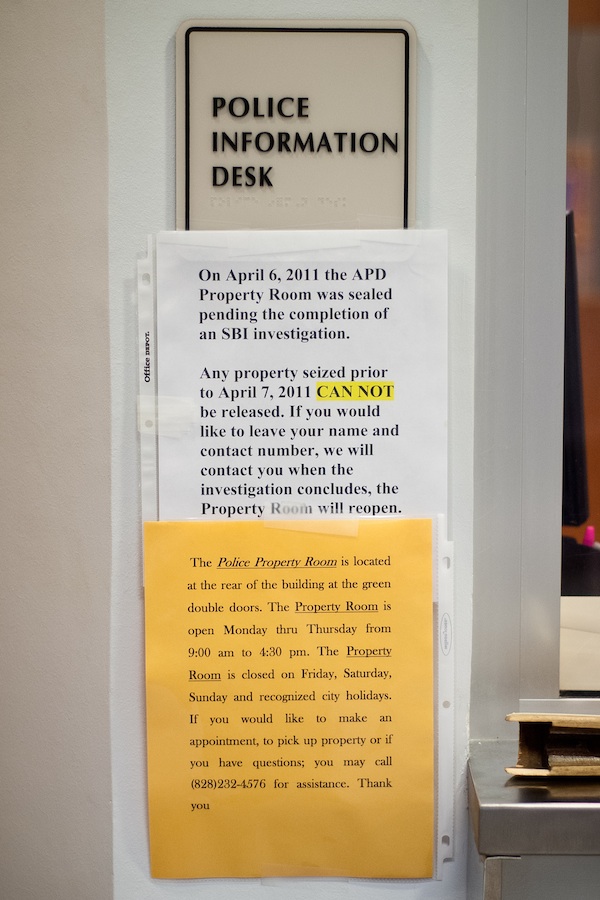Story of a scandal: More than a year after the evidence room was sealed by the SBI, signs in the Asheville Police Department cite the ongoing investigation. Photo by Max Cooper.
On May 11, the Asheville Police Department’s new chief, William Anderson, met with reporters to announce that the APD will hire a new evidence-room manager as part of a “healing process.” It’s been more than a year since news of missing guns, drugs and money wounded the department’s reputation.
Anderson, who started the job March 1, acknowledged that “this has been a black eye for the city, this has been a black eye for the department.” He said that no one presently working at the APD is under investigation in the matter, but declined to comment on whether any former employees are suspected of pilfering evidence.
Currently, a police sergeant and six other officers oversee a temporary evidence room while the old one is being investigated, Anderson said. The nationwide search for an experienced manager, who will be a civilian employee, will take three to four months, he said.
The personnel move is unlikely to quell critics who are pushing for the release of an extensive audit of the evidence room that was commissioned by City Council last April. It remains secreted away by Buncombe County District Attorney Ron Moore, who has ignored some media requests for the report and effectively denied others.
Anderson said that while he has been briefed by Moore about the audit, he hasn’t seen the report and will not discuss what it might reveal, given the ongoing investigation.
“I can’t talk about that.”
Unsolved mysteries
The controversy dates back to at least February 2011, when the department’s longtime evidence-room manager, William Lee Smith, resigned after being suspended the month before. The State Bureau of Investigation sealed the evidence room, and shortly thereafter, City Council appropriated $175,000 for the audit, and then-Chief Bill Hogan announced his early retirement.
At the time, Moore, who usually keeps a low profile, was a notably public presence. He spoke to reporters about the impact of the missing evidence on pending cases, released a partial audit showing that at least 115 items were missing, and expressed displeasure with Hogan’s handling of the situation.
Then, for months there was little news, as Blueline Systems, the auditing firm contracted by the city, made its way through the sealed evidence room. The Asheville Citizen-Times obtained and published reports about key related documents, including prior, internal audits of the evidence room (which reported that nothing was missing), and Blueline’s invoices to the city (which appeared to document a meticulous forensic inventory of the room’s contents).
In early January 2012, the company completed the audit and delivered it to Moore. No charges were forthcoming, and so far none have been filed, but Moore did tell reporters that some 200 packets of drug evidence were found to have been tainted.
Meanwhile, city officials haven’t pressed to see the audit, and City Council has taken no additional action.
In late January, and again in March, Xpress faxed Moore public-records requests asking that he release the audit. Both requests went unanswered.
Xpress consulted with attorneys from the North Carolina Press Association, who asserted that the report should go public. The state’s open-records law exempts certain documents pertaining to investigations of a person or persons. But, the attorneys noted, records like an evidence-room inventory are generally public, and the law declares that “the use of a public record in connection with a criminal investigation or the gathering of criminal intelligence shall not affect its status as a public record.”
NCPA Attorney Mike Tadych said that Moore’s lack of response to open-records requests violated requirements that officials respond “as promptly as possible,” as the state law puts it.
In early April, Xpress approached local media about calling for the audit’s release. In mid April, Moore told the Asheville Citizen-Times that he would seek the state attorney general’s opinion as to whether the audit is a public record. On April 23, nine local media outlets issued a joint statement, prepared by Xpress, that called for the prompt release of the report.
“District Attorney Ron Moore’s actions are not in compliance with either state law or the practices of transparent government that the people of Buncombe County deserve from their elected officials, especially those charged with upholding the law,” the statement said, in part. “As members of the local media who believe in a free press and open government, we call on Moore to turn over the results of the evidence room audit and help restore public trust.”
Moore has since responded, in a fashion, to requests for the report filed by other media outlets. He provided them with a short memo from the legal counsel of the state Administrative Office of the Courts in Raleigh asserting that “the audit documents you have requested are not public records as defined” by state law.


A wall of silence: District Attorney Ron Moore (top) has ignored some requests for the audit and effectively denied others. New APD Chief William Anderson (bottom) now says the hiring of a new evidence-room manager will begin a “healing process.” Top photo by Jonathan Welch, bottom photo by Max Cooper.
Waiting on the investigators
At his May 11 briefing, Anderson stressed that the audit report will likely stay under wraps until the SBI completes its probe. The bureau’s investigations, he noted, are “notoriously slow,” but thorough.
At press time, Anderson was slated to present his new evidence-room staffing plan to City Council at its May 22 meeting. It would be the first time Council has discussed the matter since commissioning the audit more than a year ago.
The city of Asheville is owed a copy of the report, according to the contract with Blueline inked when the audit began. The contract stipulates that the district attorney may first, however, remove information that might impact the investigation.
City Manager Gary Jackson has been briefed by Moore on the report but hasn’t pressed for a copy. “I’m very happy with the district attorney’s handling of the matter,” he told Xpress in April.
The members of City Council, likewise, seem mostly content to wait until Moore or the SBI decide to release the report. When Carolina Public Press polled six of the seven members earlier this month, some expressed a rising level of concern, but none said they saw a compelling need for a prompt release.
Council member Cecil Bothwell did tell the local-news site that, due to public queries about the report, he’ll request its release at the May 28 meeting of the city’s Public Safety Committee, which he chairs. “We did pay for it, we ought to get it,” he said. “At least we should request it formally. But my guess is that we’re going to be told it’s part of an ongoing investigation.”
NCPA Attorney Amanda Martin has criticized the city’s lack of pressure for the audit as “artfully trying to avoid the requirements of open records law.”






wouldn’t it be a great to see a super qualified woman managing the evidence room!
It’s past time Ron Moore and staff, every officer of the court and whomever wears a badge to get drug tested, take lie detector tests administered by tge FBI, and have their banks accounts and IRS audits initiated. Where’s the monet? where are the guns? where, what kind and how much drugs are missing: in what neighborhoods
have they been dumped, or fenced? RN’s at the bedside
are more accountble for controlled substances and with less pay and far more consequences.
A rhetorical question is begged;,” why does a
decade by decade pattern of corruption within city and county law enforvement exists that gravitates into such
criminality here, like a compass needle is compelled to
magnetic north?” The police chief engages in wistfilled thinking to fabricate any sense of healing until proof exists that all his cohorts in law emforcement are not dirty cops and officers of the courts.
I sense that a transformational scandel is about to break, in spite of Ron’s Moore’s Nixonian stonewalling
and suppressing all the truth that we deserve to know.